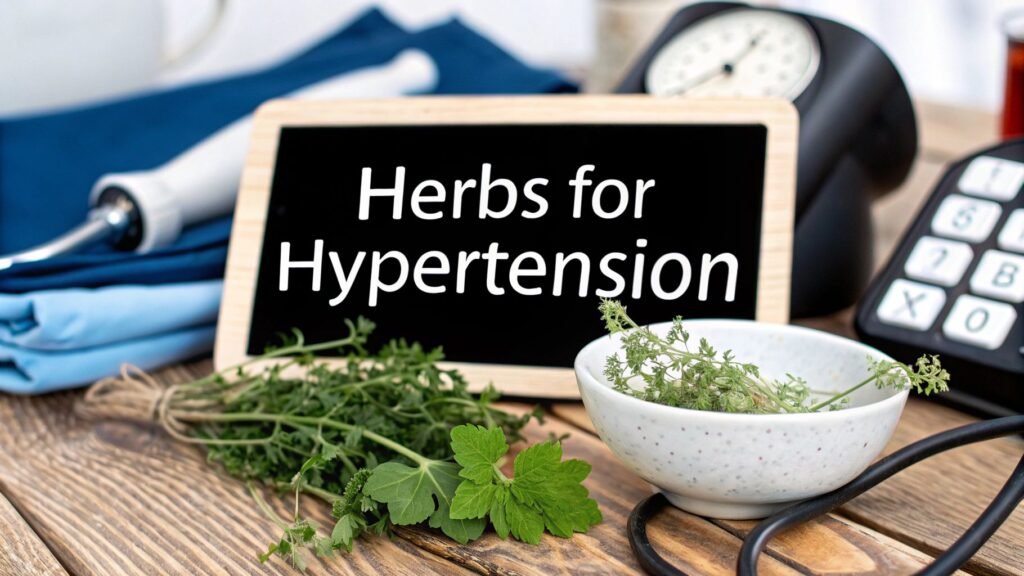Herbs and even common spices like garlic, basil, and ginger can be powerful allies in managing high blood pressure. Many of these natural options work by helping to relax blood vessels and delivering unique compounds that bolster your cardiovascular health from the ground up.
Understanding How Herbs Can Support Blood Pressure
Think of high blood pressure, or hypertension, as putting constant, excessive strain on your cardiovascular system. It’s like a home's plumbing system being forced to operate under dangerously high pressure day in and day out. Sooner or later, the pipes and connections are bound to weaken. In the same way, hypertension makes your heart work overtime and can damage the delicate walls of your arteries, which significantly raises the risk of serious health issues down the road.
It's really no surprise that millions of people are looking for natural strategies to complement their conventional medical care. This isn't just about following old traditions; it's backed by a growing body of evidence showing how specific plant compounds can have a real, positive impact on heart health. Exploring effective herbs for high blood pressure is a smart, proactive step toward building a more holistic wellness plan.
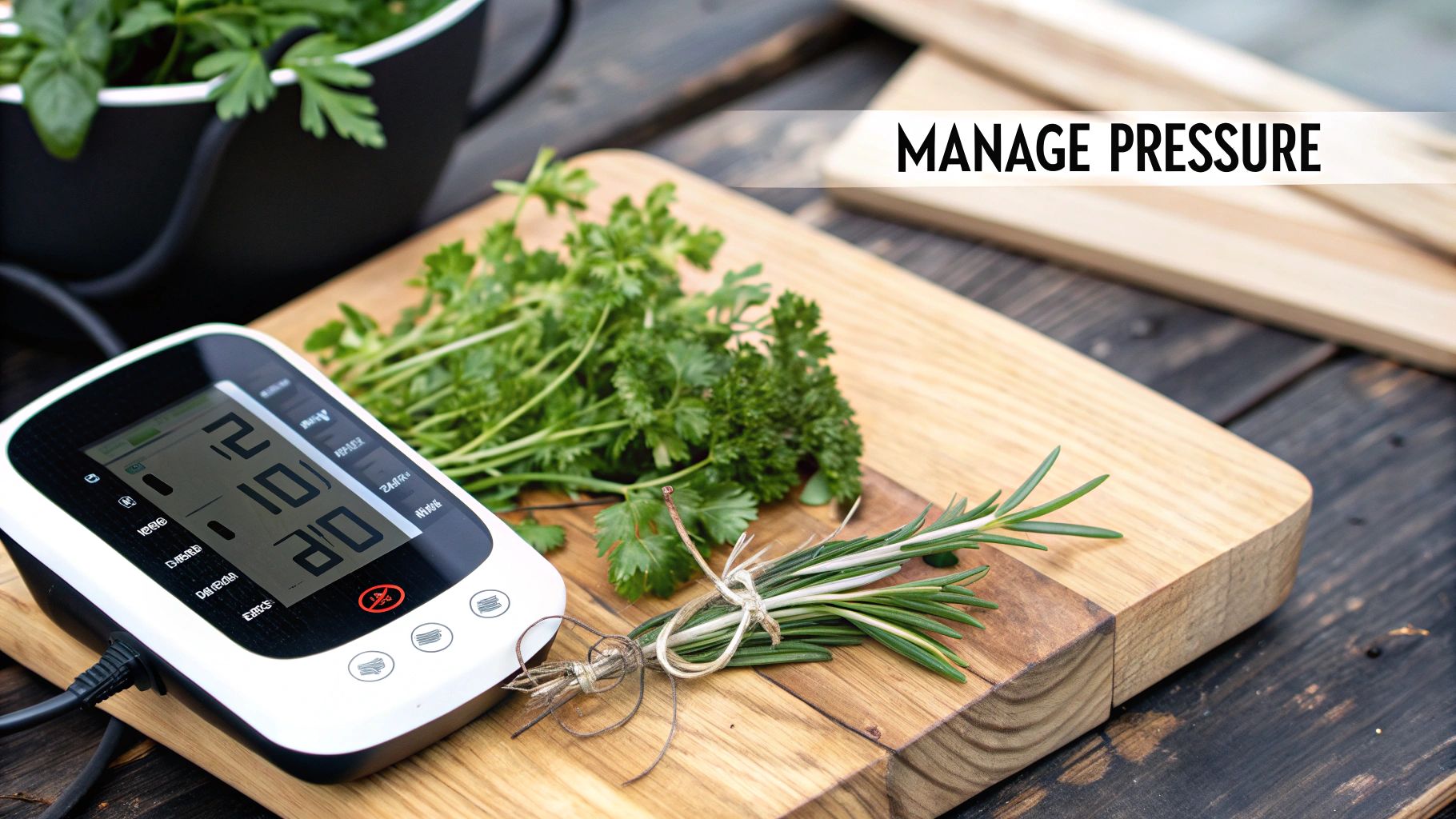
A Global Need For Supportive Care
The search for these supportive therapies has never been more urgent. The global impact of hypertension is staggering, with recent estimates suggesting over 1.4 billion people are affected worldwide.
What's even more concerning is that despite how common it is, only about 21% of adults with hypertension have it under control. This reveals a massive gap in treatment and management, highlighting the desperate need for accessible and supportive health strategies—herbal medicine included. You can dive deeper into these global health trends in the World Health Organization's recent report.
Many of these natural approaches are grounded in centuries-old practices that focus on restoring the body's balance. By understanding these principles, you can better appreciate how herbs fit into a modern health plan.
This holistic perspective is a cornerstone of many traditional healing systems. For example, you can learn more about how Traditional Chinese Medicine views health as a state of harmony and balance within the body.
What To Expect From This Guide
In this guide, we'll walk through a clear overview of the most promising herbs for supporting healthy blood pressure. We'll get into how they work, cover safe ways to prepare them, and discuss how to responsibly integrate them into your existing healthcare plan.
Our goal is simple: to arm you with trustworthy information so you can make confident, informed decisions about your own health journey.
The Science Behind How Herbs Lower Blood Pressure
To really get a handle on how herbs can help with blood pressure, we first need to look at what's going on inside the body. Think of high blood pressure as your heart having to work overtime to push blood through pipes (your arteries) that have become too narrow or rigid. Fortunately, many botanicals contain powerful compounds that tackle this problem from several different angles, all backed by solid science.
Imagine your circulatory system is a series of garden hoses. If you crank up the water and squeeze the nozzle, the pressure skyrockets. But if you open up that nozzle, the water flows smoothly. This is exactly what vasodilation does—it relaxes and widens your blood vessels, which immediately eases the pressure on your artery walls.
This is one of the most direct ways herbs can help. By encouraging your blood vessels to relax, they allow blood to flow with less force, taking a significant load off your heart.
Acting as Natural ACE Inhibitors
You've probably heard of a class of blood pressure medications called ACE inhibitors. They work by blocking an enzyme—the Angiotensin-Converting Enzyme (ACE)—which is responsible for creating a potent substance called angiotensin II that constricts your blood vessels. By shutting down that enzyme, medications keep the blood vessels open and relaxed.
What's fascinating is that nature has its own version. Certain herbs contain compounds that mimic this very same action.
- Garlic: Rich in sulfur compounds like allicin, which is thought to have a gentle ACE-inhibiting effect.
- Hawthorn: Its flavonoid content has been studied for its ability to improve circulation and relax vessels, partly through this same pathway.
This natural enzyme-blocking action helps lower blood pressure by preventing the chemical signal that tells your arteries to tighten up in the first place.
The Role of Natural Diuretics
Let's go back to our plumbing analogy. Another way to lower pressure in the pipes is to simply reduce the amount of fluid flowing through them. Your body isn't so different. When you have too much sodium, your body holds onto extra water, increasing the total volume of blood that your heart has to pump. The result? Higher blood pressure.
This is where diuretic herbs come in. They work by signaling your kidneys to gently flush out excess sodium and water. This process naturally reduces your overall blood volume, which in turn lowers the pressure within your circulatory system.
Key Takeaway: By promoting urination, diuretic herbs help your body find a healthier fluid balance. This directly lightens the workload on your heart and cardiovascular system.
It’s a gentle but effective mechanism for managing blood pressure, often without the harsh side effects that can come with some pharmaceutical diuretics.
Harnessing Antioxidant and Anti-Inflammatory Power
Over time, chronic inflammation and oxidative stress can do a number on the delicate inner lining of your blood vessels, called the endothelium. This damage causes arteries to become stiff and less responsive, making them unable to expand and contract as they should. This loss of flexibility is a major contributor to long-term high blood pressure.
Thankfully, many herbs are loaded with phenolic compounds and other powerful antioxidants that act as a defense force. They neutralize damaging free radicals and quiet down inflammation, helping to keep your arteries flexible and healthy. The research here is compelling; a major meta-analysis showed that supplements like beetroot juice, barberry, and resveratrol brought down both systolic and diastolic blood pressure far more effectively than a placebo. For a closer look, you can read the full research on these herbal compounds.
By addressing the root causes—constricted vessels, enzyme activity, fluid retention, and arterial damage—herbs provide a truly holistic way to support healthy blood pressure.
A Closer Look at 7 Top Herbs for Hypertension
With a solid grasp of the science, we can now dive into some of the most effective and well-researched herbs for managing high blood pressure. Each of these botanicals has a unique profile of active compounds that work along the very pathways we’ve just discussed—from vasodilation to acting as natural ACE inhibitors. Think of this as your field guide, breaking down the evidence behind each plant so you can understand its specific strengths.
We’ll profile seven powerful herbs, digging into their history, key compounds, and exactly how they support a healthier cardiovascular system.
1. Garlic (Allium Sativum)
Garlic is so much more than a kitchen staple; it's a medicinal powerhouse that has been trusted for heart health for centuries. Its real magic comes from its sulfur compounds, especially allicin, which is only released when a clove is crushed or chopped. Allicin is the primary driver behind garlic's blood pressure-lowering abilities.
This potent compound helps your body produce more nitric oxide, a crucial molecule that tells your blood vessels to relax and widen—a textbook example of vasodilation. The research is compelling, too. One major analysis found that garlic supplements lowered systolic blood pressure by an average of 8.3 mmHg and diastolic by 5.5 mmHg. That's a significant drop, on par with what you might see from some conventional medications.
2. Hawthorn (Crataegus Species)
Often called "the heart herb," and for good reason, hawthorn has been a cornerstone of traditional medicine for cardiovascular issues for ages. Its berries, leaves, and flowers are loaded with powerful antioxidants known as flavonoids and procyanidins. These compounds work together in a few complementary ways to support the entire circulatory system.
Hawthorn’s main benefits include:
- Boosting Blood Flow: It helps dilate the coronary arteries, the critical vessels that supply blood directly to the heart muscle.
- Strengthening the Heart's Contractions: Hawthorn has a positive inotropic effect, which means it helps the heart pump more efficiently with each beat.
- Protecting Blood Vessels: Its rich antioxidant content helps shield blood vessels from the oxidative stress that leads to stiffness and inflammation.
This multi-pronged approach makes hawthorn a foundational herb for long-term heart support.
The following infographic shows how different herbs, like Garlic and Hawthorn, use distinct primary mechanisms to help manage blood pressure.
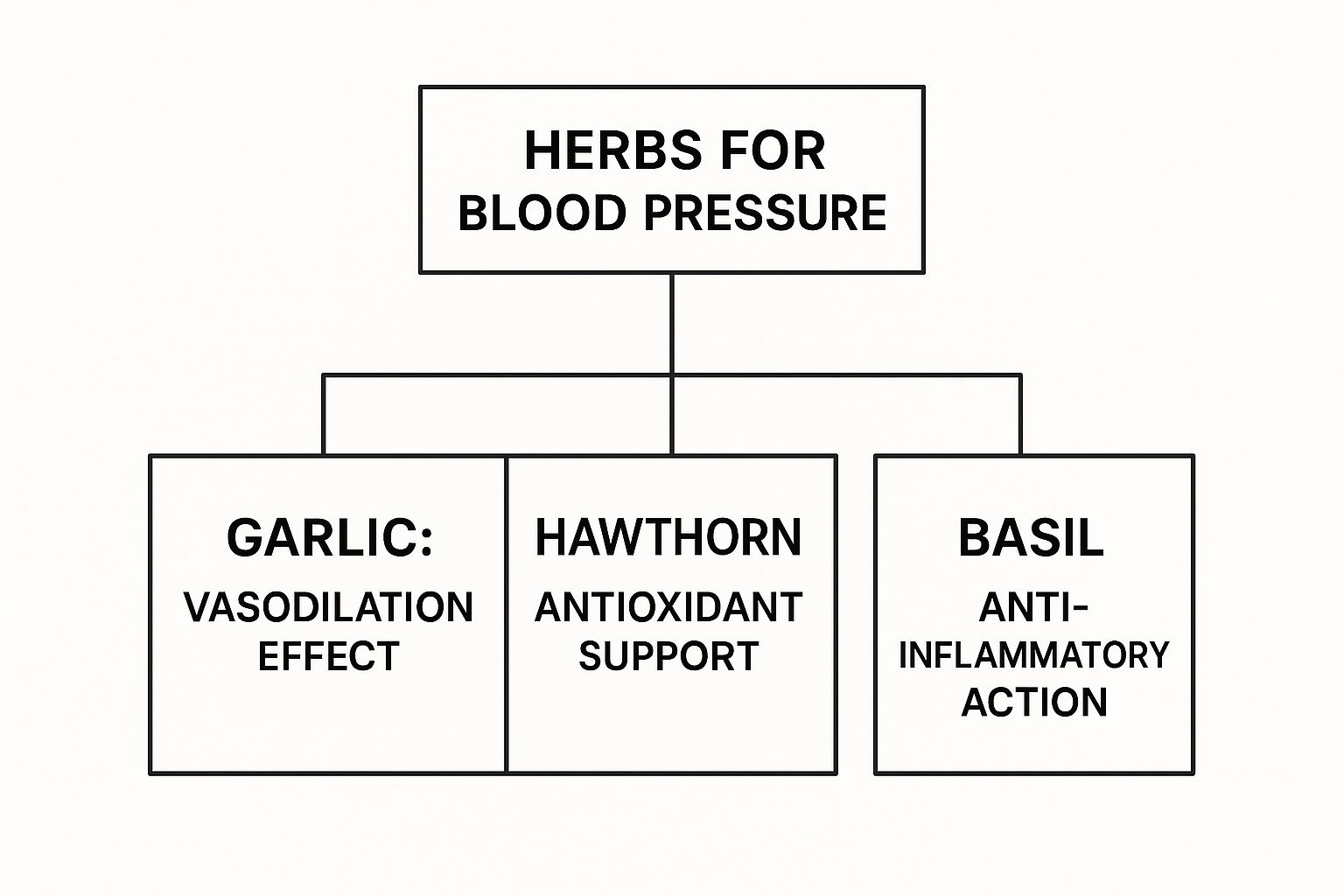
This visual really drives home the point that there’s no single "magic bullet." Instead, these botanicals offer a whole toolkit of supportive actions, from vasodilation to taming inflammation.
3. Hibiscus (Hibiscus Sabdariffa)
Best known for its vibrant, tart tea, hibiscus is also a formidable ally in the fight against hypertension. The deep red calyces of the flower are brimming with anthocyanins and other polyphenols, which have been studied extensively for their ability to lower blood pressure.
Its primary mechanism appears to be a one-two punch of diuretic and ACE-inhibiting actions. Hibiscus gently encourages the kidneys to flush out excess sodium and water, which helps reduce overall blood volume. At the same time, its compounds seem to mildly inhibit the angiotensin-converting enzyme (ACE), stopping the chemical cascade that constricts blood vessels. This dual action has made it one of the most popular and effective herbs out there.
4. Olive Leaf (Olea Europaea)
While olive oil gets all the glory for its healthy fats, the leaves of the olive tree contain a powerful compound of their own: oleuropein. This potent antioxidant is the real star behind olive leaf extract’s benefits for blood pressure.
Research points to oleuropein’s ability to promote the relaxation of blood vessel walls, which directly improves blood flow and reduces pressure. It also delivers a healthy dose of antioxidant and anti-inflammatory support, protecting the delicate lining of the arteries from long-term damage.
Olive leaf extract lets us harness the cardiovascular benefits of the olive tree in a concentrated form, specifically targeting the health and flexibility of our blood vessels.
Its protective effect on the endothelium makes it an excellent choice for maintaining arterial wellness over the long haul.
5. Basil (Ocimum Basilicum)
That sweet basil in your kitchen has some surprising benefits for blood pressure. Its therapeutic properties come from a high concentration of an antioxidant compound called eugenol.
Eugenol acts as a natural calcium channel blocker. In the body, calcium helps signal the muscles in your artery walls to tighten up. By blocking some of that calcium from entering the muscle cells, eugenol helps your blood vessels stay relaxed and open. This action lowers resistance throughout your circulatory system, making it much easier for your heart to do its job.
6. Cinnamon (Cinnamomum Verum)
This warm, aromatic spice isn't just for flavor; it’s been used in traditional medicine for centuries. When it comes to hypertension, cinnamon seems to help by improving overall cardiovascular health, which naturally leads to better blood pressure readings.
While the exact mechanisms are still being explored, some research suggests that regular cinnamon consumption can help relax and dilate blood vessels. A review of multiple studies found that consistent intake led to an average reduction of 6.2 mmHg in systolic and 3.9 mmHg in diastolic blood pressure, especially when taken consistently over several weeks.
7. Ginger (Zingiber Officinale)
Ginger is a true multitasker. We know it for its anti-inflammatory and digestive benefits, but its impact on the cardiovascular system is just as impressive. It tackles high blood pressure from two angles, acting as both a natural calcium channel blocker and a gentle ACE inhibitor.
By preventing blood vessels from tightening and simultaneously improving circulation, ginger helps reduce the overall strain on the heart. Studies have shown that consuming just 2-4 grams of ginger a day is associated with a lower risk of developing hypertension. Plus, it’s incredibly easy to add to meals, smoothies, or brew into a soothing tea.
While these herbs show incredible promise on their own, it's important to remember that herbal medicine often works on a systemic level. The holistic effects can also support related issues like mood and stress, which are often tied to cardiovascular health. For example, you can learn more about herbal medicine for depression to see how these approaches can overlap and support overall well-being.
How to Safely Prepare and Dose Herbal Remedies
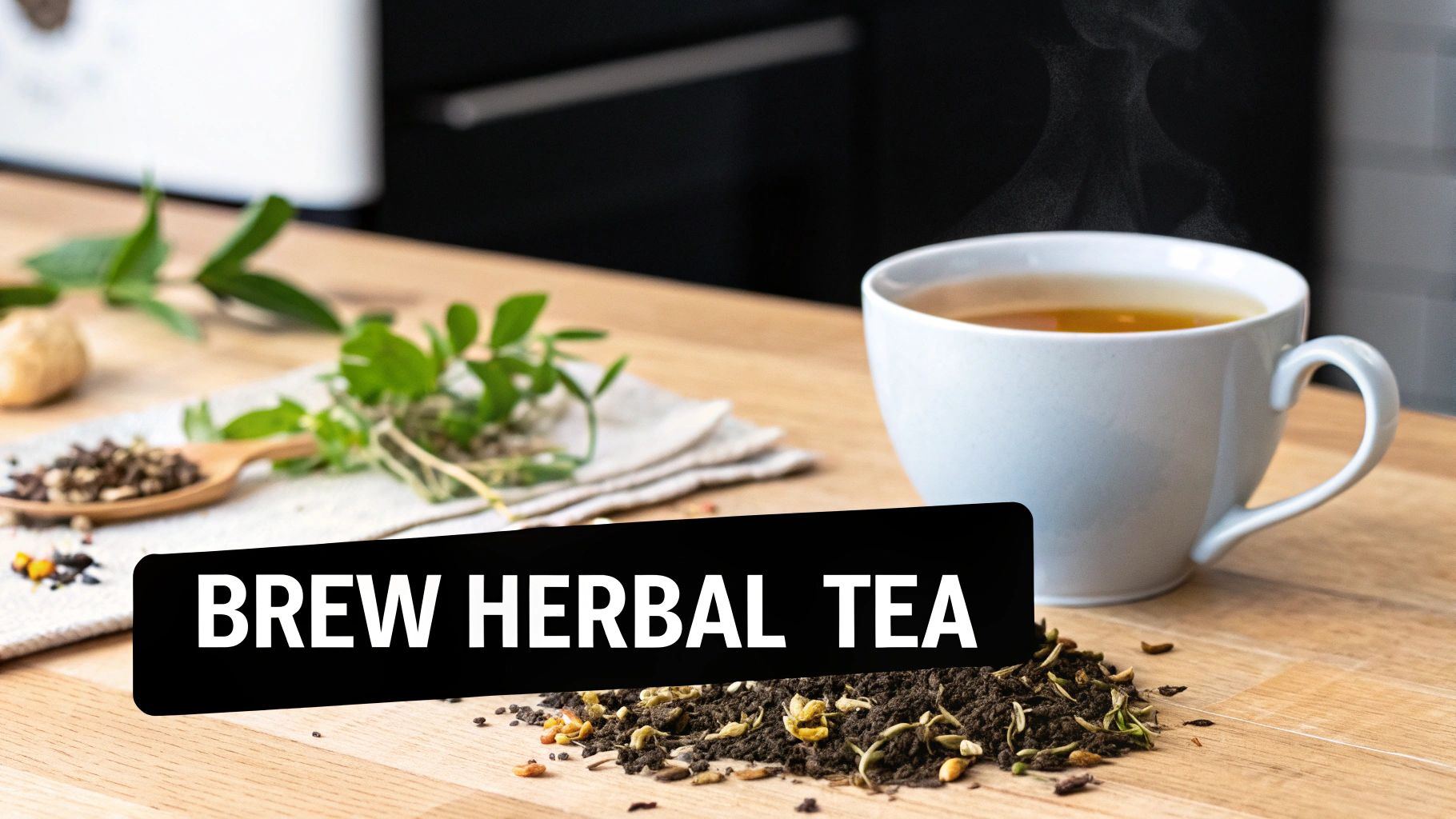
Knowing which herbs can help with high blood pressure is just the first step. The real art lies in knowing how to use them safely and effectively. Just because something is "natural" doesn't mean it's automatically risk-free. Correctly preparing and dosing these powerful botanicals is what unlocks their therapeutic potential while keeping you safe.
Think of it like cooking. A chef uses different methods—roasting, steaming, frying—to bring out the best in each ingredient. In the world of herbal medicine, preparations like teas, tinctures, and capsules are our "cooking methods," each designed to maximize an herb's specific benefits.
Choosing the Right Herbal Preparation
The form you choose directly impacts the herb's potency, how convenient it is to take, and how your body absorbs its active compounds. There’s no single "best" method; it's about what fits your lifestyle and health goals.
Let's break down the most common options:
- Teas (Infusions and Decoctions): This is the classic, time-honored way to take herbs. Steeping plants in hot water is perfect for extracting water-soluble compounds and gives you a gentle, hydrating dose. Teas are wonderful for daily use with herbs like hibiscus and ginger.
- Tinctures (Alcohol Extracts): By using alcohol as a solvent, tinctures pull out a much broader spectrum of a plant’s chemistry, including compounds that water leaves behind. They are highly concentrated, last for ages, and allow for very precise, drop-by-drop dosing.
- Capsules (Powdered Herbs): For sheer convenience, nothing beats a capsule. You get a pre-measured dose without any of the taste, which is a lifesaver for potent-tasting herbs like garlic.
- Standardized Extracts: These are a more modern, scientific preparation. An extract is concentrated to guarantee a specific amount of a key active compound, like the oleuropein from olive leaf. This ensures consistency from dose to dose, which is crucial when targeting a specific physiological outcome.
The way you prepare an herb is just as important as the herb itself. Each method extracts different compounds and delivers them to your body in a unique way.
Comparing Herbal Preparation Methods
| Preparation Type | How It's Made | Best For | Key Consideration |
|---|---|---|---|
| Teas/Infusions | Steeping dried or fresh herbs (leaves, flowers) in hot water. | Gentle, daily support and hydration. Excellent for water-soluble vitamins. | Potency can vary. Not effective for extracting resins or oily compounds. |
| Tinctures | Soaking herbs in alcohol (or sometimes glycerin/vinegar) for weeks. | A broad spectrum of compounds, long shelf life, and precise, small doses. | The alcohol base is not suitable for everyone. Taste can be very strong. |
| Capsules | Finely ground, dried herbs are placed in a gelatin or vegetable capsule. | Convenience, taste-masking, and taking a pre-measured, simple dose. | The body still has to break down and digest the raw plant material. |
| Standardized Extract | Isolating and concentrating specific active compounds from the plant. | Consistent, high-potency dosing when targeting a specific therapeutic effect. | Lacks the full synergistic spectrum of the whole plant, which some practitioners prefer. |
Ultimately, choosing a preparation comes down to balancing your needs for potency, convenience, and the specific herb you're working with.
General Dosing Guidelines and Precautions
While every herb and every person is different, a few guiding principles can help you get started. But please, treat these as just that—starting points. You should always consult with a qualified healthcare professional or herbalist before adding any new herbal regimen to your routine.
Crucial Safety Note: Never, ever stop or reduce your prescribed blood pressure medication without your doctor's explicit guidance. Herbal remedies are best viewed as a supportive, complementary strategy, not a replacement for your medical treatment plan.
This integrated approach is gaining traction worldwide. The World Health Organization's Global Hearts Initiative, launched in 2016, actively promotes lifestyle changes and evidence-based treatments for hypertension, which includes the responsible use of supportive plant-based supplements. You can learn more about the WHO's efforts to control global hypertension on who.int to see how this fits into a bigger health picture.
Navigating Potential Interactions and Side Effects
This is arguably the most critical piece of the puzzle. Many herbs work on the very same biological pathways as pharmaceutical drugs, and combining them without knowledge can lead to trouble.
Key Interactions to Be Aware Of:
- With Blood Pressure Medications: Herbs that lower blood pressure, like garlic and hawthorn, can amplify the effect of drugs like beta-blockers or ACE inhibitors. This can cause your blood pressure to drop too low (hypotension).
- With Blood Thinners: Herbs like garlic and ginger have mild anticoagulant (blood-thinning) properties. If you're on a medication like warfarin, this combination could increase the risk of bleeding.
- With Diuretics: Certain herbs, most notably hibiscus, have a diuretic effect. When taken with prescription "water pills," this could lead to an excessive loss of essential electrolytes like potassium, which is critical for heart function.
It’s also vital to be aware of contraindications. For instance, most herbs are not recommended during pregnancy or breastfeeding simply because we lack the data to confirm their safety. If you have any pre-existing kidney or liver conditions, you must be extra cautious and work with a professional.
By approaching herbal medicine with respect, awareness, and expert guidance, you can safely integrate its profound benefits into your health journey.
Integrating Herbs with Your Medical Treatment Plan
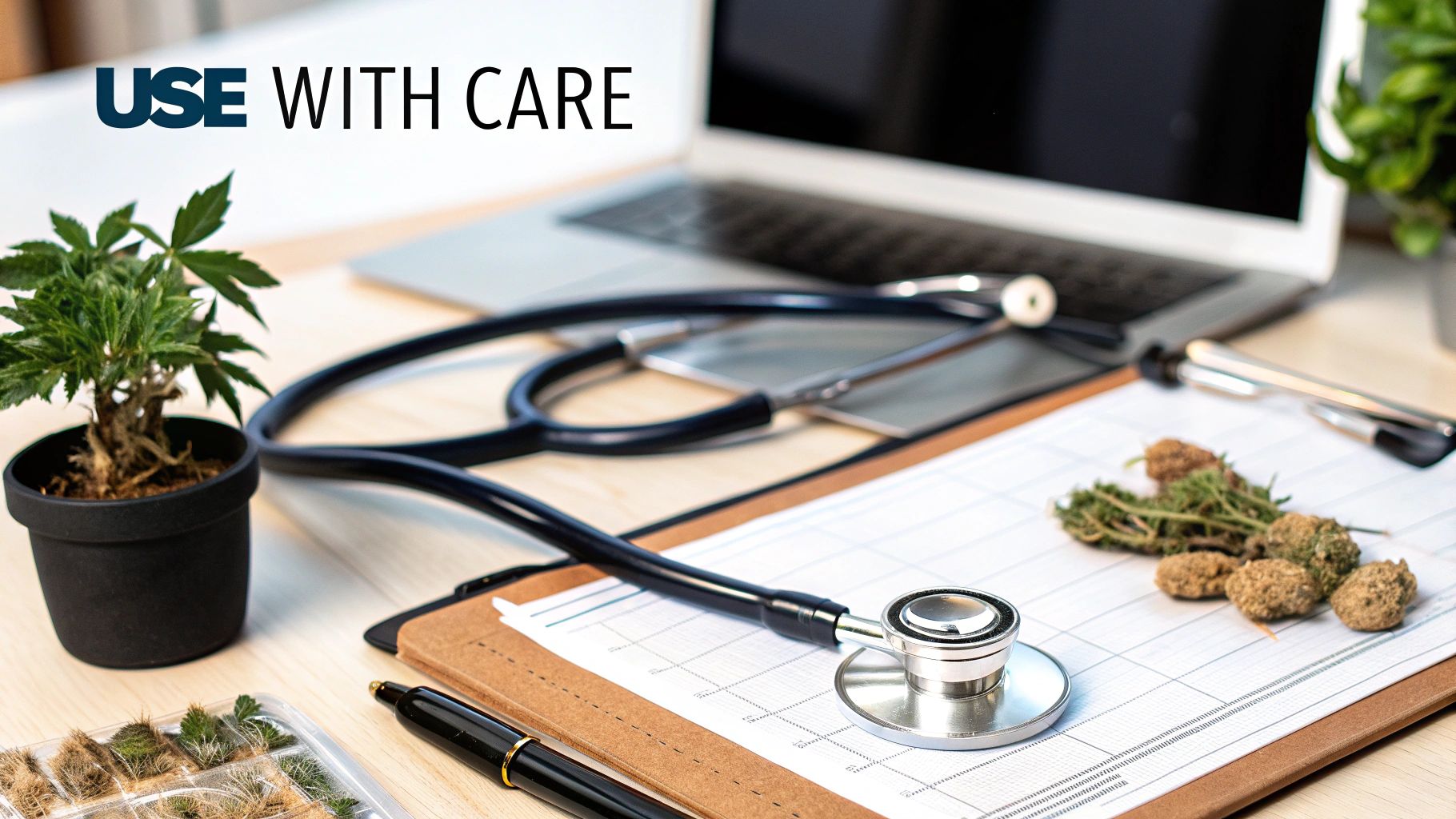
Exploring herbs for high blood pressure can be a really positive step, but it’s crucial to see it as part of a bigger picture. The safest and most effective path is one where natural remedies complement, not compete with, the advice and prescriptions from your doctor. Think of it as adding a new specialist to your personal healthcare team, with you as the team captain.
This partnership hinges on one thing: open and honest conversation. Your doctor knows your full health history and can provide critical insights into how an herb might react with medications you're already taking or a specific health condition you have. Full transparency ensures everyone is on the same page and working toward the same goal—your well-being.
How to Talk to Your Doctor
Bringing up herbal medicine with your physician can feel a little intimidating, but it doesn't have to be. Coming to the conversation prepared with good information can make all the difference, turning a potentially awkward chat into a truly productive planning session.
When you sit down with your doctor, be ready to go over the specifics:
- The Herb You're Considering: Tell them which herb you're interested in, like hawthorn or hibiscus, and what made you consider it.
- The Form and Dosage: Mention how you plan to take it—as a tea, capsule, or tincture—and any dosage information you’ve come across.
- Your Full Supplement List: Be sure to list every single vitamin, mineral, or other herbal supplement you take. You’d be surprised what can interact.
This level of detail gives your doctor the context they need to give you sound, personalized advice and keep you safe.
Key Questions to Ask Your Healthcare Provider
After you've shared your intentions, it's your turn to ask questions. This back-and-forth is absolutely essential for creating a regimen that is both safe and effective for you.
Here are a few great questions to get the conversation started:
- Are there any known interactions between this herb and the medications I'm currently taking?
- Looking at my overall health, are there any specific risks or side effects I should be aware of?
- Should I change how or when I monitor my blood pressure at home if I start taking this?
- Are there any particular symptoms I should be on the lookout for?
Your doctor’s job isn’t to shut down your interest in natural options. It's to help you navigate them safely. This kind of collaborative spirit is what minimizes risks and maximizes the benefits of both worlds—conventional medicine and herbal support.
A Practical Example of Integration
Let's walk through a real-world scenario. Imagine a patient, Sarah, who is taking a standard blood pressure medication but is curious about adding hawthorn tea to her daily routine. She books an appointment with her doctor and brings her notes along.
Sarah explains that she'd like to drink two cups of hawthorn tea a day. Her doctor reviews her current prescription, a common ACE inhibitor. The doctor confirms that while hawthorn is generally considered safe, it can also lower blood pressure. The concern isn't that it won't work—it's that it might work too well when combined with her medication, causing her pressure to drop too low.
Working together, they map out a clear plan. Sarah will start with just one cup of tea per day and continue checking her blood pressure at home each morning. She'll log her readings in a journal to review with her doctor at a follow-up visit in one month. This methodical, supervised approach lets Sarah safely weave a supportive herb into her treatment plan without any risky guesswork.
Common Questions About Herbs for Blood Pressure
When you start looking into herbal remedies for high blood pressure, it's completely normal for questions to pop up. Let's walk through some of the most common ones I hear from patients, so you can feel more confident and informed on your path to better health.
How Long Does It Take for Herbs to Work?
This is usually the first thing people want to know. Unlike a prescription pill that can bring numbers down quickly, herbs work on a different timeline. Their effects are more gradual and cumulative, gently nudging your body's systems back into balance over time.
For most herbal protocols, you'll need to be consistent for several weeks, or even a few months, to see a stable, meaningful change in your blood pressure. It's less like flipping a light switch and more like tending a garden—it takes time and consistent care for things to grow and flourish. Of course, the exact timing depends on the herbs you're using, the dosage, your unique health situation, and your lifestyle.
Can I Stop My Prescription Medication?
I can't stress this enough: Never, ever stop or change the dose of your prescribed blood pressure medication without talking to your doctor first. Suddenly stopping can cause a dangerous rebound effect, where your blood pressure shoots up and significantly raises your risk for a stroke or heart attack.
Think of herbs as a supportive player on your health team, not a substitute for your doctor's care. The goal here is smart integration. Your doctor can help you safely add herbs into your routine, keep an eye on your progress, and make sure everything is working together for your benefit.
Are There Herbs to Avoid with High Blood Pressure?
Yes, absolutely. Knowing what to avoid is just as crucial as knowing what might help. Some herbs can actually increase blood pressure or have serious interactions with medications.
Here are a few well-known examples to be cautious with:
- Licorice Root: It contains a compound called glycyrrhizin, which can make your body hold onto sodium and water while losing potassium—a direct recipe for higher blood pressure.
- Ginseng (Panax species): While a fantastic herb for many, some types of ginseng can be too stimulating and may raise blood pressure, especially in sensitive individuals.
- St. John's Wort: This herb is famous for interfering with a long list of medications, including blood pressure drugs, by messing with how your body processes them.
This isn't a complete list, which is why it's so important to get professional guidance before adding any new herb to your regimen.
How Do I Choose High-Quality Supplements?
The supplement industry can feel a bit like the Wild West because it's largely unregulated. To make sure you’re getting a product that’s both safe and effective, your best bet is to look for brands that use third-party testing.
Look for seals from organizations like USP, NSF, or ConsumerLab on the label. This tells you an independent group has verified that the product actually contains what it says it does and isn't full of contaminants.
Choosing a reputable company that's transparent about where they get their ingredients and how they make their products is key. A good company won't hesitate to share its quality control information if you ask.
Remember, a solid health plan is about more than just one thing. Just as herbs can support your heart, they can also bolster other systems. For example, you can discover how to strengthen your immune system with natural methods that often go hand-in-hand with a heart-healthy lifestyle.
At Eric Tsai Acupuncture and Herbs, we specialize in creating personalized wellness plans that integrate the best of traditional wisdom and modern understanding. If you're ready to explore a balanced approach to your health, visit us at drerictsai.com to learn more and schedule a consultation.

